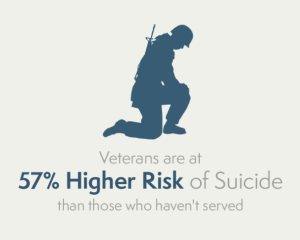According to the Department of Veteran’s Affairs National Veteran Suicide Prevention Annual Report (2019), the suicide rate among Veterans is 1.5 times greater than non-Veteran population ages 18+, with over 6,000 Veterans dying by suicide each year. Despite accounting for just 7.9% of the population, Veterans account for 13.5% of all suicide deaths in the United States.
Suicide has no single cause and no one approach can end it – but by treating and preventing mental health and substance use conditions, addressing access to lethal means (firearms accounted for 72% of Veteran suicide in 2021), and empowering Veterans and Service members to live and thrive in their communities, we can make a difference.
Police and firefighters are more likely to die by suicide than in the line of duty, according to research. Experts suggest that chronic workplace stress may place first responders at increased risk for suicide and mental health issues, such as post-traumatic stress disorder and substance abuse.

Call or text 988 to connect to the Idaho Suicide and Crisis Lifeline. 24 hours a day, 7 days a week, 365 days a year.

Compact Act
The COMPACT Act aims to reduce suicide among veterans by allowing them to receive immediate treatment from any VA or non-VA medical facility during a suicidal crisis. This emergency treatment is free and veterans do not need to be enrolled in VA healthcare to receive this benefit. This means that up to 9 million more veterans are eligible for emergency care of acute suicidal crisis.
- Department of Veteran Affairs and Department of Defense: Lethal Means Counseling: Recommendations for Providers
- Department of Veterans Affairs: Safe Home Environment Fact Sheet
- Department of Veterans Affairs: Keepitsecure.net
- Department of Veterans Affairs: Lethal Means Safety Brochure
- Department of Veterans Affairs Rocky Mountain MIRECC (Mental Illness Research Education and Clinical Center) for Suicide Prevention: Lethal Means Safety & Suicide Prevention
- National Strategy for Preventing Veteran Suicide (va.gov)
- TAPS Assistance Program For Survivors
- Veterans Crisis Line: Firearm Safety Firearm Safety Video
- Veteran Suicide Data and Reporting
- What Does COMPACT Act, Mean For Veterans? | VA Cincinnati Health Care | Veterans Affairs
- Suicide Awareness for Law Enforcement Officers (SAFLEO) Training
- SAFLEO is a free suicide prevention training for law enforcement officers (classroom based or virtual self-paced options)
- SAFLEO site also provides links for podcasts and resources specifically addressing suicide and mental health for law enforcement




